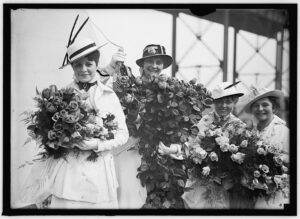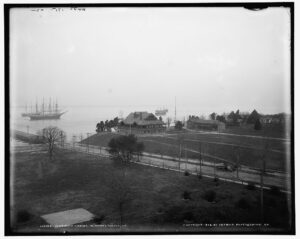Southern Legitimacy Statement Fifth generation Floridian. So far south, I ain’t got a twang. But my great-great grandparents (Joseph B. Keen/e, 1837-1898 and Mary P. Bronson, 1840-1921) are buried in the Shingle Creek Cemetery south of Orlando, Florida, tucked behind a small church near the intersection of Irlo Bronson Highway and Old Vineland Road. My great grandparents were born in the Shingle Creek Settlement, but moved to St. Petersburg, FL in 1904 where my grandmother grew up. She moved to Sarasota probably around 1917. She ran a boarding house before marrying my grandfather and raising 11 children. Though my father was a self-proclaimed “hillbilly” from West Virginia, my mother, my five siblings and I, and my contemporary relatives were born in Sarasota. I moved to Orlando in 1990.
The Doll in the Mirror
I didn’t know how to be a girl, how to be a friend. Fifty years later, and I still don’t. I didn’t know how to walk out of my big house into my one room cottage, a row of them built for poor people. We sat in class together. I don’t remember if it was fourth or fifth grade—does it matter?
I didn’t think I was lonely. I didn’t know that my house encouraged me to carry knives and whips in my tongue. I didn’t know the ground was falling beneath me, or that the pine trees were losing their own lives while I was trying to walk past the hands of my father, past the fractured shoulder of my mother. I know this: you showed up in class, and I thought your one room house—no bigger than my bedroom at my house—was cute and interesting, a house of lost and broken toys. The day my mother allowed me to visit you after school—to get off the bus with you and go into your shack even though your parents were not home—was sunrise in my sheltered eyes. I’m not apologizing for that.
The pretend sex happened first at your house, on your mother’s mattress on the floor. You knew the moves, not the why. You were a doll in a mirror that fascinated me. I didn’t understand my mouth on your panties or my mouth on yours. What were we supposed to do other than mouth on panties? You didn’t know why your mother’s boyfriend did this to your mother, but you wanted to try it and I agreed. I’m not apologizing for this.
Even before you came to our town, our school was a row of broken children dressed as marionettes, stories from books teachers read to us or stories trying to locate each state on a map of different colors. Some kid stole all the toilet paper from the bathrooms and TP’d the playground, which is why by the time you arrived, we had to carry, in shame, a single roll of toilet paper with us down the exterior hall to the girls’ bathroom. You were not there yet in second grade, when I peed my pants for the first time. I was staring at the seams in Mrs. Holland’s dress from my front row desk. I didn’t speak. Every day she wore a different color dress: pink, green, blue, and yellow, all of them as pale as if she had taken them from the evening sky and poured bleach on them. I sat still, hoping no one noticed. I watched the sky of her dress as a little bit of pee escaped. The dress fit her body, curving in at the waist, spreading out toward her shoulders. The darts on the sides of her dress pointed toward the tips of her breasts. Two breasts pointing directly at me and I knew that she knew what I knew: I was a failure. No one at school knew I was a bed wetter. I didn’t know that I’d be a bed wetter well into high school. In second grade, I pressed my inner leg muscles and caught the warmth so that just a puddle lay beneath my butt. I held it until Mrs. Holland stopped talking and I asked permission to go to the bathroom. Once outside the classroom door, I breathed and let the warm liquid flow down my legs. Our room was at the north end of the porch of our six-room school building.
Our room had hardwood floors and twenty second-graders staring at me—the little girl peeing her pants. I turned and stepped down onto the hardened grass. I walked around the playground, passed the field where the Halloween Carnival would be held, the kickball field, the monkey bars, the chin-up bars, the swing set, the baseball field, and circled back around to the south end of the porch. I came face to face with Mr. Cox, our principal.
I told Mr. Cox I had to go to the bathroom, and he said to go and then to get back to class. “You’re at the wrong end of the hall,” he said. I knew, of course, the girls’ bathroom was at the other end of the porch, close to our classroom. Maybe he saw the pee or smelled it. Maybe he thought he’d punished me enough. In the bathroom, I stuffed paper towels into my underwear. I flapped the bottom of my dress like a flag as I walked back to my classroom.
The second time it happened was when Mrs. Holland asked me to play “Jesus Loves Me” on the new piano. I didn’t want to sit in front of all those kids and play, but I knew to obey adults. I needed to pee, but instead of asking to use the bathroom first, I sat down at the piano. Again, I held the pee inside, but a small puddle escaped. It was near the end of the day, and as soon as I finished playing, I asked to leave. Maybe I should apologize for this, but I am not.
Your mother and her boyfriend hadn’t moved to town yet, you hadn’t yet put your mouth on my panties, and I hadn’t put mine on yours. You hadn’t yet shown me the way your mother’s boyfriend did pushups on top of your mother. You hadn’t yet told me how you watched them after they thought you were asleep in that one room house. I was already ashamed of my body.
The third time I peed my pants, I hoped I could make it through reading circle. I tried to hold it in, and my holding released it slowly, but then I couldn’t hold it any longer. I watched faces of five other kids to see if they noticed as pee dripped off the sides of my wooden chair. One kid laughed, pointed. The pee fell faster and all the kids in my circle were laughing, and then the pee was forming puddles on the wooden floor and all the kids in class were pointing and laughing. Mrs. Holland shooed them all back to their seats and sent one of them to the office to call my mom. Mrs. Holland asked me if I wanted to leave the room, but I was too embarrassed to answer. I didn’t know how to get out of the chair.
I don’t know why I turned on you. Memory will not allow me access to the reason you were my friend one day and then one day I punched you in the face. You slapped back. Maybe I worried the other kids could see my ugliness. Perhaps I feel vulnerable, naked, exposed? Is that why I made you my enemy? I don’t know. Maybe the other kids pointed out the difference between my big house and your little house. But we’d been friends. We’d agreed.
Your last name fascinated me, and I made a joke of it. I made a joke of what it rhymed with. The name I called you, which I can’t say even now and haven’t said to anyone since you left our school, plays in my ear like a broken jack-in-the-box on perpetual repeat. The name not only identified you, but identified your class status, your poverty, the little house packed with broken toys, headless dolls, wires, dust, and food left out from the previous night’s dinner.
I am ashamed. I am a woman with LIAR written across her face. There is no kindness I can do now to take it back. I am a Liar, liar, pants on fire woman.
Let me return to the day when I first made a joke of you. Let me put a muzzle on my little mouth. I would tell you to ignore that girl. I’d thank you for letting that girl into your house, your life, and for letting her share your confusion about sex. I had no right to make your name into a joke, into ratty hair dangling from tree branches.
You left our little town. I don’t know when.
You left after I tackled you in the sandy pit outside the school building and punched you in the face. I doubt you and your mother leaving town had anything to do with me, but back then, back when I was that girl, maybe I felt powerful. Maybe I had to show you who was boss. The little row of houses where we touched each other in the dark has disappeared. Gated, private, wealthy communities are there now. People tootling around in golf carts, pretending poverty doesn’t exist. Pretending girls like you are not made fun of or bullied. Fifty years later, that girl, that woman carries all those useless words in her pitiful and wrinkled hands.







